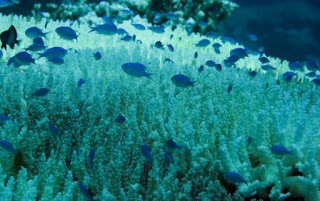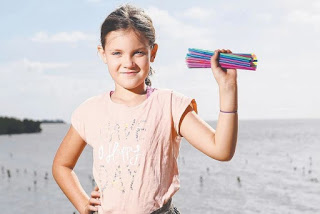 A ten-year-old Australian girl has convinced the Cairns Regional Council (in Queensland) to phase-out straws and single-use plastics. Cairns girl Molly Steer has been running her “Straw No More” campaign for about a year and has already convinced more than 90 schools in Australia and overseas to do away with drinking straws.” Americans use 500 million plastic straws a day and they cannot be recycled. Many end up in the ocean and harm wildlife there.
A ten-year-old Australian girl has convinced the Cairns Regional Council (in Queensland) to phase-out straws and single-use plastics. Cairns girl Molly Steer has been running her “Straw No More” campaign for about a year and has already convinced more than 90 schools in Australia and overseas to do away with drinking straws.” Americans use 500 million plastic straws a day and they cannot be recycled. Many end up in the ocean and harm wildlife there.
2. Gulf Stream Current Weakest in 1600 Years
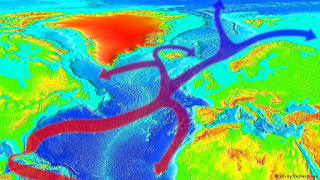 The Atlantic Meridional Overturning Circulation (Amoc) current is being affected by climate change. Its usual circulation is to bring warm water north to the Arctic, and there the water cools and sinks. But with the influx of freshwater from melting ice caps, and the warmer seawater due to climate change, the Amoc current is weakened. This could bring extreme winters to Western Europe and sea levels would rise fast on the East Coast of the United States and “disrupt vital tropical rains.”
The Atlantic Meridional Overturning Circulation (Amoc) current is being affected by climate change. Its usual circulation is to bring warm water north to the Arctic, and there the water cools and sinks. But with the influx of freshwater from melting ice caps, and the warmer seawater due to climate change, the Amoc current is weakened. This could bring extreme winters to Western Europe and sea levels would rise fast on the East Coast of the United States and “disrupt vital tropical rains.” —————————————————
3. NOAA & EPA Budgets Protected by Congress
 NOAA and EPA program budgets have been saved by Congress. “NOAA would receive $5.9 billion under the legislation, and includes $1 billion for the National Weather Service and $883 million for NOAA Fisheries operations, research and facilities. U.S. EPA is funded at $8.1 billion in the bill, which is equal to current funding levels, despite White House calls to slash it by nearly one-third. That amount includes $2.9 billion for the Clean Water and Drinking Water state revolving funds, as well as $1.15 billion for the Superfund program.”
NOAA and EPA program budgets have been saved by Congress. “NOAA would receive $5.9 billion under the legislation, and includes $1 billion for the National Weather Service and $883 million for NOAA Fisheries operations, research and facilities. U.S. EPA is funded at $8.1 billion in the bill, which is equal to current funding levels, despite White House calls to slash it by nearly one-third. That amount includes $2.9 billion for the Clean Water and Drinking Water state revolving funds, as well as $1.15 billion for the Superfund program.”
—————————————————
4. The Tide is Turning for San Francisco Bay
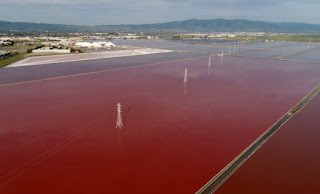 In June of 2016, San Francisco Bay Area voters approved Measure AA which would raise $500 million for “wetlands restoration, flood control and wildlife projects.” $18 million is now being voted on for projects in 6 counties. “The projects range from $7.4 million to restore former Cargill industrial salt evaporation ponds in Mountain View, Alviso and Hayward, to $450,000 to restore sand dunes, build a trail and clean up debris along Alameda’s shoreline.”
In June of 2016, San Francisco Bay Area voters approved Measure AA which would raise $500 million for “wetlands restoration, flood control and wildlife projects.” $18 million is now being voted on for projects in 6 counties. “The projects range from $7.4 million to restore former Cargill industrial salt evaporation ponds in Mountain View, Alviso and Hayward, to $450,000 to restore sand dunes, build a trail and clean up debris along Alameda’s shoreline.”
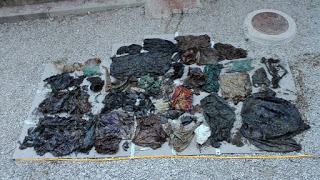 A recent necropsy of a young sperm whale that washed ashore in southern Spain has found 65 pounds of plastic trash inside the whale’s stomach and intestines. Debris included “dozens of plastic bags, chunks of mangled rope and glass, a large water container and several “sacks of raffia (a fiber derived from palm trees).” The whale died from peritonitis, an abdominal infection. The whale could not excrete all the plastic it had accumulated. Plastics in the ocean is a huge issue, and it is estimated that there are 5 trillion pieces of plastic in the oceans now.
A recent necropsy of a young sperm whale that washed ashore in southern Spain has found 65 pounds of plastic trash inside the whale’s stomach and intestines. Debris included “dozens of plastic bags, chunks of mangled rope and glass, a large water container and several “sacks of raffia (a fiber derived from palm trees).” The whale died from peritonitis, an abdominal infection. The whale could not excrete all the plastic it had accumulated. Plastics in the ocean is a huge issue, and it is estimated that there are 5 trillion pieces of plastic in the oceans now.
—————————————————
Climate change not only affects air temperatures, but it affects the ocean too. Marine heatwaves are happening more frequently and are lasting longer. “A study published yesterday in Nature Communications suggests that there’s been a 54 percent increase in the number of annual ‘marine heatwave days’ since the 1920s. Overall, heat waves are lasting about 17 percent longer than before, and their frequency has increased by about a third.”
Read More…
—————————————————
Be sure to “LIKE” http://facebook.com/SeaSave to ensure our “Week in Review” is delivered to your newsfeed every Friday.
Sea Save Foundation is committed to raising awareness of marine conservation. The Week in Review is a team effort produced by the Sea Save staff to provide a weekly summary of the latest in marine research, policy, and news.

